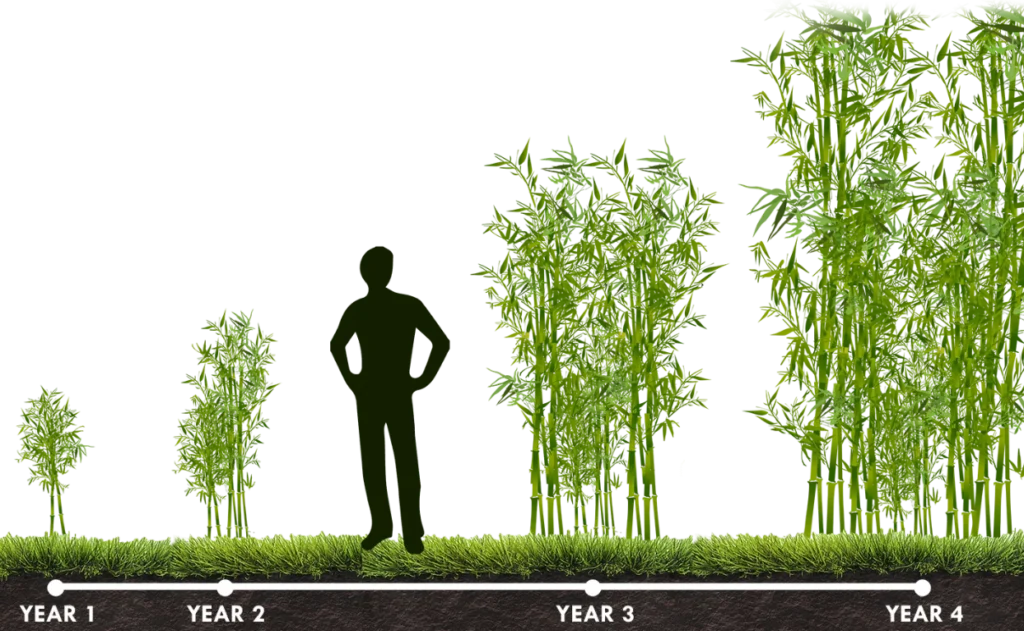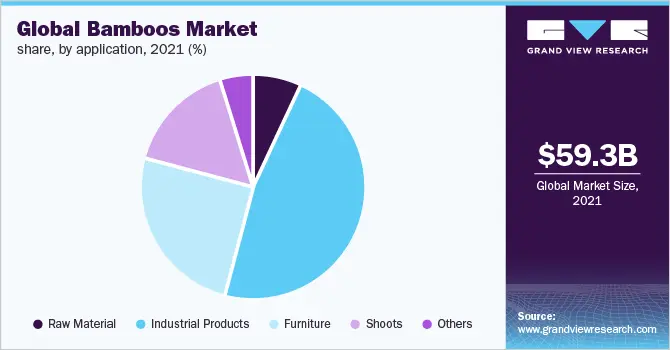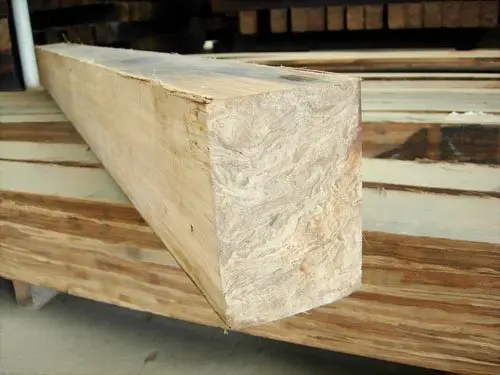“Bamboo: A remarkable resource that bends and shapes itself to fulfill diverse needs— building homes, fueling imagination, and nurturing a sustainable future.”
Steven Zoernack
“Bamboo: A remarkable resource that bends and shapes itself to fulfill diverse needs— building homes, fueling imagination, and nurturing a sustainable future.”
Steven Zoernack
(1) Rapid Growth: Bamboo’s astounding ability to rapidly shoot upwards has earned it the prestigious title of being the fastest-growing plant on Earth. With certain bamboo species capable of achieving astonishing growth rates of up to three feet per day, it outpaces virtually all other vegetation in terms of sheer speed. This remarkable characteristic not only highlights bamboo’s remarkable resilience but also underscores its pivotal role as a highly renewable and sustainable resource.
The rapid growth of bamboo is a testament to its remarkable adaptability and efficiency in harnessing resources from its environment. Its ability to capitalize on sunlight, water, and nutrients with such efficiency allows it to achieve exponential growth in short periods. This remarkable trait not only ensures a steady supply of raw material for various industries but also contributes significantly to carbon sequestration and soil stabilization.
Furthermore, bamboo’s rapid growth offers numerous practical advantages. Its quick maturation cycle allows for frequent harvesting without depleting the plant’s resources, making it an ideal candidate for sustainable forestry practices. Additionally, its dense growth habit makes it an excellent choice for erosion control, watershed protection, and wildlife habitat restoration initiatives.
In essence, bamboo’s rapid growth isn’t just a biological marvel; it’s a crucial asset in the quest for environmental sustainability. By harnessing the power of this fast-growing plant, we can mitigate deforestation, combat climate change, and create a more resilient ecosystem for future generations.
(2) Incredible Strength and Durability: Bamboo stands out as an exceptional construction material due to its remarkable strength and durability. With a tensile strength surpassing that of steel, bamboo offers unparalleled resilience against heavy loads and harsh weather conditions. Its impressive strength-to-weight ratio outshines many traditional building materials, making it a preferred choice for use in construction materals such as lumber, flooring and roofing.
Moreover, bamboo boasts a remarkable resistance to rot, surpassing that of numerous other wood types. This durability stems from its unique composition and natural properties. Bamboo’s high silica content acts as a natural preservative, significantly reducing its susceptibility to decay, pests, and fungi compared to conventional wood materials. Additionally, the dense fibers inherent in bamboo, coupled with its rapid growth, further enhance its ability to withstand environmental factors that often lead to rot in other wood species.
In conclusion, bamboo’s incredible strength, coupled with its exceptional resistance to rot, solidifies its status as a premier choice for construction materials. Its ability to withstand heavy loads, extreme weather conditions, and prolonged exposure to outdoor elements makes it a reliable and sustainable option for a wide range of construction projects
(3) Versatile Uses: Bamboo’s versatility spans across numerous industries, including construction, furniture, flooring, paper production, textiles, and culinary arts. From structural components to stylish furnishings, bamboo finds applications in lumber, scaffolding, chairs, tables, flooring, paper, fabric, and kitchen utensils. Its adaptability and strength make it a preferred choice for various purposes.
Bamboo flooring provides a sustainable alternative to traditional hardwood, boasting durability and aesthetic appeal. In textiles, bamboo fabric offers softness and breathability, while bamboo utensils serve both functional and decorative purposes in the kitchen. The plant’s versatility underscores its role as a renewable resource with a wide array of practical uses.
Whether supporting building structures, enhancing interior design, or contributing to eco-friendly products, bamboo’s versatility continues to make it an invaluable asset across industries. Its ability to meet diverse needs while remaining environmentally sustainable highlights its importance in modern manufacturing and design.
(4) Environmental Benefits: Bamboo stands as a sustainable alternative to numerous conventional materials, offering significant environmental advantages. Unlike traditional lumber sources, bamboo can be harvested without killing the plant, thus aiding in reducing deforestation. Moreover, bamboo exhibits a remarkable capacity to absorb carbon dioxide from the atmosphere, contributing to efforts in combating climate change. Through its ability to sequester carbon and release oxygen, bamboo plays a vital role in promoting air quality and mitigating the effects of greenhouse gas emissions. Overall, bamboo’s eco-friendly properties make it a valuable resource in fostering a more sustainable future for our planet.
(5) Natural Beauty: Beyond its practical uses, bamboo possesses a natural elegance and beauty. The distinctive segmented stalks, lush green leaves, and delicate swaying in the wind create a visually appealing landscape. Bamboo groves have an aesthetic charm that adds tranquility to gardens and natural surroundings. Yoga enthusiasts, book readers and others come to sit in the peaceful groves to relax and breathe in the extra oxygen given off by bamboo plants.

As one of the fastest growing and renewable plants in the world, Bamboo is noted for its strength, usability and economical benefits in construction, textile, paper, food, medical, furniture, landscaping and many other industries. Bamboo has a higher rate of compressive strength than brick, wood or concrete. From being hailed as a superfood in the nutrition world and as a substantial building material, to being used in municipal and aesthetic purposes, bamboo provides a practical result for almost all purposes.
Bamboo has many uses such as flooring, structural (lumber), roofing, furniture, food, biofuel, fabrics, cloth, paper, pulp, charcoal, ornamental garden planting, and environmental characteristics, such as a large carbon sink and phytoremediation options, improving soil structure and soil erosion.

Pressed lumber made from bamboo presents several advantages over other types of wood commonly used in home construction. Firstly, bamboo boasts exceptional strength and durability, surpassing even steel in tensile strength. Engineered pressed bamboo lumber further enhances these properties, ensuring resilience against heavy loads and adverse weather conditions. Sustainability is another key benefit, as bamboo is a rapidly renewable resource that can be harvested in just a few years, unlike traditional trees which take decades to mature. Additionally, bamboo’s natural resistance to pests and decay reduces the need for chemical treatments, making it a healthier and more environmentally friendly option.
Bamboo lumber represents the future of green, sustainable, and responsible home building practices. Its inherent qualities make it stronger and straighter than conventional wood, while also being more cost-efficient in the long run. Moreover, bamboo’s resistance to termites and rot adds an extra layer of durability, ensuring that structures built with bamboo lumber stand the test of time.

Bamboo Lumber- the future of Green, Sustainable, Responsible home building practices – Stronger, Straighter, More Cost Efficient, Termite and Rot Resistant
Bamboo poles are widely used in construction due to their strength, flexibility, and sustainability. They serve multiple purposes including structural elements such as columns and beams, roofing frameworks, wall systems, flooring, scaffolding, and decorative elements. Bamboo’s lightweight nature, combined with its durability and aesthetic appeal, makes it a valuable resource in construction. Its versatility and eco-friendly properties make it a viable alternative to traditional construction materials.
With their remarkable versatility and inherent strength, bamboo poles serve as a reliable building material, providing structural support for homes, bridges, and other infrastructure projects. Their flexibility allows for innovative architectural designs, while their lightweight nature simplifies transportation and installation.

“Bamboo poles serve as a multifunctional resource in home construction, providing structural integrity, insulation, and an eco-friendly alternative to traditional building materials.”
Bamboo fiber is naturally hypoallergenic and anti-fungal and contains bamboo-kun, a very strong antibacterial agent. Thanks to its smooth and round structure, bamboo fiber remains fresh and delicate, and possesses a natural shine both visually and to the touch, also protecting against UV rays. It is mainly used for undergarments, neonatal attire, swimsuits, bathrobes, towels and sanitary materials.
The antimicrobial bio-agent makes bamboo products naturally resistant to mold, odors and bacteria.
Bamboo can be used to produce a variety of paper products, including printing and writing paper, packaging materials, tissue paper and hygiene products, stationery and notebooks, specialty and artistic papers, labels and tags, and even wallpaper and wall coverings. Its versatility as a raw material enables the creation of sustainable and eco-friendly alternatives.

Embracing bamboo fiber in textiles and paper products promotes a greener, more sustainable future.
Bamboo leaves have diverse uses. They are utilized as animal feed, play a role in traditional medicine, and are used to make bamboo leaf tea. In crafts, they are employed to create decorative items. Bamboo leaves also find application in composting, mulching, and as bedding material for animals. Their versatility contributes to their value in different aspects of human life, ranging from agriculture to cultural practices and environmental applications.
As the bamboo leaves fall to the ground, they decompose and release essential nutrients back into the soil, contributing to the fertility and sustainability of the bamboo ecosystem. Therefore, bamboo leaves not only support the overall health of the plant but also contribute to the surrounding environment by recycling nutrients and promoting soil health..

“Bamboo leaves: a vibrant source of energy, nurturing the plant and enriching the soil, a testament to nature’s sustainable design.”
Bamboo shoots are a common vegetable in Asian culture and cuisine. They are delicious, nutritious and have antioxidant properties, and can be frozen and cold stored similar to vegetables like zucchini and asparagus. Shoots can aid in weight loss, reduce risks of cancer, and strengthen the immune system. They are rich in anti-inflammatory properties which helps with heart health, respiratory disease, stomach ailments. Bamboo shoots are also known to lower cholesterol levels.
Bamboo Shoots are becoming increasingly popular and are in high demand. However, the availability of fresh edible bamboo shoots is very limited for much of the year and in many places of the world lasts for only a few months. The demand for shoots in the USA exceeds over 80,000 tons annually and is steadily increasing as our health conscious society discovers them.

“Bamboo shoots: nature’s hidden delicacy, sprouting with flavor and potential, a culinary delight awaiting discovery.”